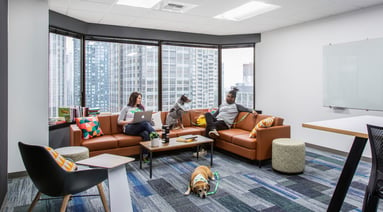
How many recessions have there been, and how long did they last? What does the Covid-19 recession look like and how does it compare to previous recessions? How should businesses respond? In a new series of articles, we take a look at these key questions, before diving into the effects of a recession on the corporate real estate market.
Recession is defined as two consecutive quarters of declining GDP. According to Forbes[i], they’re considered “an unavoidable part of the business cycle… the regular cadence of expansion and contraction that occurs in a nation’s economy”. During a recession, economic activity declines, jobs are lost, and people cut back on spending, thus completing a vicious circle. Severe recessions are informally labelled ‘depressions.
[i] https://www.forbes.com/advisor/investing/what-is-a-recession
What have past recessions looked like?
The difficulty with recession is subjectivity: everyone has their own experience of past recessions, which colours their approach to new ones, so it can be helpful to look at the evidence. For example, there are more recessions than we might think, but they tend to be shorter than we might think (they typically last between 6 and 15 months, however there can be lingering effects).
For example, in the 1900s:
- USA – there were 20 recessions, averaging one every 5 years, lasting 10 months to 10 years
- UK – there were 7 recessions, averaging one every 14 years, lasting 6 months to 3 years
- Australia – this ‘new’ country managed to avoid many recessions, but felt the Great Recession (1930s) and recessions in 1974-5 and 1990-91 – but then no further recessions until August 2020, after ‘the world’s longest boom’ .
Impact on GDP can vary hugely. In the 1900s:
- USA – GDP fell 0.3% in the early 2000s recession, which seems like a breeze compared to the plummet of 32.7% over 10 months in the post-war depression of 1920–21 .
- UK – the impact ranged from 10.9% drop in GDP in 1919 (following the Great War) to just 0.26% in the early 1990s recession .
- Australia – GDP fell from +1.5 in mid-1973 to -3.2% at the close of 1974. GDP fell by 1.7% in 1990-91 .
Another misconception is there’s some magical ‘normal’ we all go back to between recessions. Although coming out of recession means being back into growth, that growth rate may be significantly lower than prior to the recession. For example, after the early 1990s recession in the UK, it took eleven quarters to get back to the pre-recession peak GDP of spring 1990.
In recession, 'if you fail to prepare, then prepare to fail'
A Harvard Business Review study about the effects of recessions, examined how 4,700 companies fared across the recessions of 1980, 1990, and 2000. It found while 17% of the firms went bankrupt, went private or were acquired, 9% of them actually flourished, performing at least 10% better than competitors. Subsequent studies by Bain and McKinsey reported similar findings.
The difference, according to HBR, was preparation. The Bain study found of the companies which fared badly after the Great Recession of 2008-9, “Few made contingency plans or thought through alternative scenarios… When the downturn hit, they switched to survival mode, making deep cuts and reacting defensively.” Failing to respond within the recession can also make it extremely difficult to catch up afterwards.
Beating a recession demands smarter strategies
Price-slashing, cost-cutting and going after competitors may be simplistic and ineffective approaches to weathering a recession: instead, more flexible approaches, and investment in the right areas, can be central to survival and success. The HBR article mentioned above goes on to show that companies manage best when they can be flexible and nimble, especially in the four key areas of debt, decision-making, workforce management, and digital transformation.
Thriving seems to depend on three key factors:
- Investing in IT because the opportunity cost is lower during recession. New technology can make savings and can make the company more transparent, flexible and efficient.
- Decentralising decision-making because centralisation means ‘hoarding’ decision rights, yet recessions require decisions to depend on expertise. Whether done physically or organisationally, decentralisation makes firms better able to adapt, especially to localised change.
- Where possible, avoiding lay-offs/redundancies because they can be costly in the long run. It’s better to introduce furloughs, shorter hours and performance-related pay.
Another HBR article, Roaring out of Recession[i] found companies took either defensive or offensive approaches to recession, and the key to success is not polarisation but achieving the optimum balance between the two strategies.
[i] https://hbr.org/2010/03/roaring-out-of-recession
How does the Covid-19 recession compare?
While it’s too early to tell how this recession will size up to past ones, some figures have been dramatic. In June, the World Bank forecasted the global economy will shrink by 5.2% in 2020 – representing the deepest recession since the Second World War . When looking at the numbers across the US, Europe, and Asia Pacific, the immediate impact of Covid-19 on the economy has been far and wide. In the US, more than 16 million people lost their jobs in just three weeks between March and April, “an unheard-of figure.” In the UK and Australia, both experienced GDP losses, with the UK going into its first recession in 11 years and the steepest ever GPD fall (20.4%).
With the current economic impact and uncertainty about how deep or wide the recession will cut, it’s important to look at strategies to help you not only weather the recession, but come out on top. With flexibility and agility in mind, our workplace framework, Propeller helps you re-evaluate your real estate portfolio and future proof your business.
Talk to us about Propeller, or start a conversation for ideas to help your business thrive in our current economic environment. |
Did you find this article interesting? Stay tuned for the next piece in the Covid-19 recession series, When will we see the green shoots?, as we look at the interplay between recessions and the commercial real estate market and how current economic environment may affect future real estate trends.


